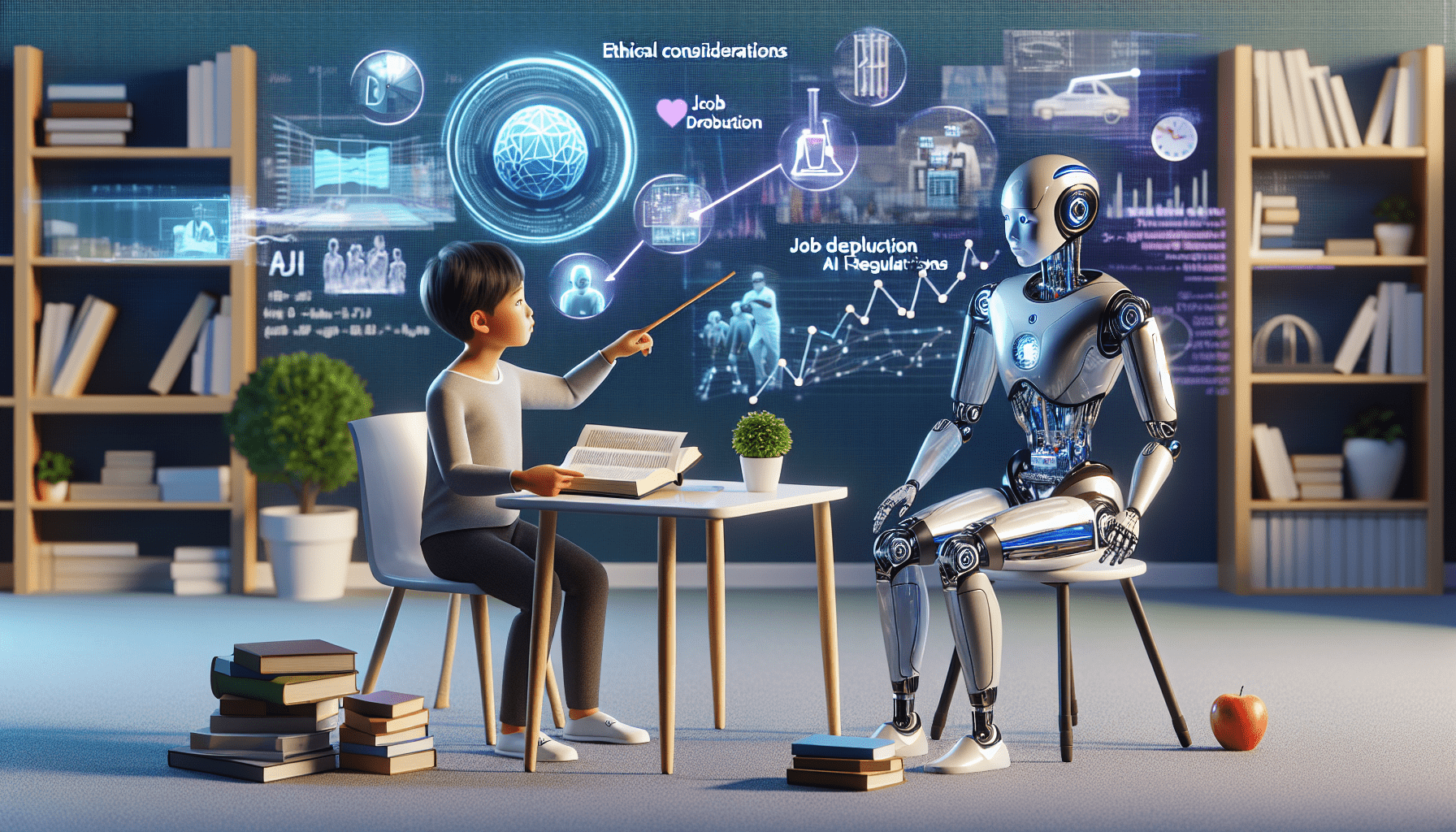Artificial intelligence (AI) is revolutionizing various aspects of our daily lives, from medicine to transportation and employment. This documentary, titled “The Impact of Developments in Artificial Intelligence on Society,” explores the profound changes that AI is bringing to our society. It examines the opportunities and dangers presented by AI, such as its ability to detect diseases like Parkinson’s and cancer, control vehicles like cars and aircraft, and create realistic sound and video recordings that blur the line between fact and fiction. The documentary raises questions about the role of algorithms in decision-making, the implications of AI-driven surveillance, and the need for regulation in the field of AI. It also highlights the work being done by researchers at Stanford University in developing AI algorithms for medical diagnostics. Overall, the documentary aims to shed light on the potential of AI while also addressing the ethical and social implications associated with its rapid growth.
Artificial intelligence and algorithms are leading to significant advancements that have the potential to transform our world. In this documentary, viewers will embark on a journey to explore the hotspots of AI research in Europe, the USA, and China. The documentary will delve into the impact of AI on various aspects of society, including medicine, transportation, and employment. It will shed light on the work of researchers at Stanford University who are developing AI algorithms to screen X-rays for diseases and identify conditions like Parkinson’s disease through voice analysis. However, the documentary will also address concerns surrounding AI, such as the difficulty in understanding and trusting algorithms, the rise of widespread surveillance, and the need for responsible implementation and regulation. Ultimately, the documentary aims to provide viewers with a comprehensive understanding of the opportunities and challenges posed by developments in AI.
The Impact of Developments in Artificial Intelligence on Society
Introduction of Developments in Artificial Intelligence
Artificial intelligence (AI) is rapidly advancing and has the potential to revolutionize various aspects of our daily lives. With the ability to detect diseases, control vehicles, and make decisions, AI is already exhibiting its capabilities. However, along with the opportunities, there are also concerns about the dangers and ethical implications of AI. This documentary explores the impact of AI on society and delves into the research hotspots in Europe, the USA, and China to understand how AI is shaping our future.
Applications of AI in Medicine
One of the most promising applications of AI is in the field of medicine. The advancement of algorithms has enabled the early detection and diagnosis of diseases like Parkinson’s and cancer. Researchers at Stanford University have developed algorithms that can screen X-rays and identify diseases with a high level of accuracy. This breakthrough technology can assist healthcare professionals in making faster and more accurate diagnoses, potentially saving lives. AI is also being used to analyze voice patterns and smartphone data to identify Parkinson’s disease, highlighting its potential in disease detection and management.

AI in Employment
The rapid growth of AI raises concerns about its impact on employment. While AI has the potential to make work more efficient, it can also render many professions obsolete. Algorithms are capable of making decisions on loans, insurance risks, and employee evaluations; however, the opacity of these decision-making processes raises concerns. It is crucial to strike a balance between the benefits of AI in the workplace and the ethical implications it poses. Understanding the implications of AI on employment is essential for shaping policies and ensuring a fair and inclusive work environment.
AI in Decision-making Processes
AI’s ability to make decisions is a double-edged sword. On one hand, algorithms can analyze vast amounts of data quickly and make decisions based on patterns and probabilities. This can be beneficial in areas such as loan approvals or medical diagnoses. On the other hand, the opacity of algorithmic decision-making raises concerns about accountability and fairness. Humans might not fully understand how these decisions are made, which can lead to biased outcomes. Striking a balance between the efficiency of AI and the need for transparency and accountability is crucial.

Challenges of AI Surveillance
One of the challenges posed by AI is the potential for widespread surveillance. China’s use of a social credit system, supported by AI, raises concerns about personal freedoms and democracy. AI’s capability for monitoring citizens and assessing their behavior can have significant implications for privacy and individual rights. Balancing the benefits of surveillance for security purposes with the need for privacy is a complex issue that requires careful consideration and regulation.
Questions about Algorithmic Decision-making
The documentary raises important questions about the decision-making process entrusted to algorithms. Which decisions should be made by humans and which ones can be delegated to AI? The social implications of relying on AI for decision-making need to be thoroughly examined to ensure fairness and accountability. As AI becomes more integrated into our lives, it is essential to understand the potential pitfalls and dangers of algorithmic decision-making.

Promotion of DW Documentary
The content of this documentary aims to promote DW Documentary and highlights the importance of understanding the impact of AI on society. With its informative and thought-provoking content, DW Documentary provides viewers with in-depth knowledge and insights into global events and current affairs. Through its various channels and social media platforms, DW Documentary encourages viewers to explore the world around them and build a deeper understanding of the complexities of daily life.
Revolutionizing Daily Life with AI
Artificial intelligence has the potential to revolutionize various aspects of daily life, including medicine, transportation, and employment. The advancements in AI technology offer opportunities for increased efficiency and improved quality of life. From self-driving cars to personalized medicine, AI has the potential to transform the way we live and interact with the world around us. However, harnessing the benefits of AI while addressing the ethical and societal challenges is crucial for responsible implementation.

Regulation in the Field of AI
As AI continues to advance, there is a growing need for regulation and governance in the field. The ethical implications and potential risks associated with AI necessitate a framework to ensure transparency, accountability, and fairness. Regulation can help address concerns such as bias in algorithms, data privacy, and the impact on employment. Collaboration between governments, industry leaders, and researchers is essential in developing regulations that balance the benefits of AI with the protection of individual rights and societal well-being.
Work Culture and AI
The integration of AI into the workplace raises questions about work culture and employee well-being. The digitization of operations, such as the 996 work schedule in China where employees work from 9am to 9pm, six days a week, demonstrates the potential impact of AI on work-life balance. It is crucial to ensure that AI is implemented in a way that prioritizes the well-being of employees and promotes a healthy work culture. This includes addressing concerns about job security, retraining opportunities, and fair compensation in the face of automation.

Digitization of Operations
The digitization of operations, exemplified by the $20 million investment in a digitized restaurant, has the potential to improve efficiency and customer experience. By integrating AI into operations, businesses can enhance processes, reduce costs, and increase productivity. However, the digitization of operations also raises concerns about job displacement and the impact on human interaction. It is important to strike a balance between technological advancements and maintaining the human touch in customer service and other areas.
Privacy Concerns in China
China’s use of AI for surveillance and control raises significant privacy concerns. The trade-off between security and privacy is a complex issue, and China’s social credit system exemplifies the potential dangers of unchecked surveillance. It is crucial to find a balance that prioritizes personal freedoms and privacy while ensuring public safety. The ethical implications of AI surveillance need careful consideration and regulation to protect individual rights and democracy.
AI in Efficient Urban Planning
The documentary highlights the use of AI in efficient urban planning. The smart city control center in Shenzhen, China, utilizes AI to optimize urban planning and resource allocation. AI algorithms can analyze data from various sources, such as traffic patterns and energy consumption, to make informed decisions on urban development. This efficient planning has the potential to enhance sustainability and improve quality of life for residents. However, it is important to consider the ethical implications of AI in urban planning and ensure that decisions prioritize the well-being of the community.
AI in Surveillance and Law Enforcement
AI’s potential for surveillance and law enforcement is a topic of concern and debate. The use of surveillance cameras and live streaming body cams by law enforcement agencies raises questions about the balance between public safety and individual privacy. The documentary explores different views on surveillance and examines the drop in crime rates in China as a result of increased monitoring. It is essential to critically assess the impact of AI in surveillance and law enforcement to maintain a balance between security and privacy.
Lack of Transparency and Privacy Concerns
The lack of transparency in AI algorithms and the privacy concerns associated with tech giants like Facebook and Google are pressing issues in today’s society. The documentary raises awareness about the opacity of algorithmic decision-making processes and the potential biases they may exhibit. The consolidation of power by tech giants further emphasizes the need for transparency and regulation. It is crucial to address the lack of transparency and privacy concerns to ensure that AI technology is developed and implemented responsibly.
Google’s Emphasis on AI
Google’s emphasis on AI is evident in its product development and patent application. The company recognizes the potential of AI to improve user experiences and drive innovation. Google’s patent application focusing on capturing household noises to deduce habits and behaviors showcases the company’s vision for AI integration. However, the increasing influence of tech giants like Google raises concerns about their power and impact on society. It is important to critically analyze the influence of tech giants and call for regulation to prevent the consolidation of power.
Responsible Implementation of AI
The responsible implementation of AI requires transparency, user control, and consideration of ethical implications. Google’s efforts to address privacy concerns through technologies like Google Home highlight the importance of user control and transparency in AI systems. By allowing users to control their data and privacy settings, Google aims to alleviate concerns and promote responsible AI implementation. It is essential for companies and policymakers to prioritize user control, transparency, and ethical considerations when developing and implementing AI technologies.
Concerns over Tech Giants’ Influence
The influence of tech giants like Google, Facebook, and Amazon is a topic of concern. Their extensive reach and power raise questions about monopolies, privacy, and the impact on society. The documentary highlights the lobbying activities of Google and the potential influence it has on regulations and policymaking. It is crucial to monitor and regulate the influence of tech giants to ensure fair competition, protect privacy, and promote a diverse and democratic digital landscape.
Calls for Regulation of Tech Giants
There is a growing call for the regulation of tech giants to safeguard consumer rights and protect democracy. The consolidation of power by tech giants raises concerns about their influence over markets and information. Calls for regulation aim to ensure fair competition, protect user privacy, and promote accountability. It is essential for policymakers to address the concerns surrounding tech giants and establish regulations that promote a healthy and competitive digital ecosystem.
Consolidation of Power by Tech Giants
The rapid growth and consolidation of power by tech giants pose significant challenges for the digital landscape. These companies have amassed vast amounts of data and wield immense influence over markets and information. The concentration of power raises concerns about privacy, competition, and democratic values. It is crucial to monitor and regulate the influence of tech giants to prevent the abuse of power and protect the interests of individuals and society as a whole.
Future Implications of Technological Advancements
As technology continues to advance, the potential implications of AI and other technological advancements need careful consideration. While fully autonomous vehicles are not expected to be a reality for at least 10-20 years, research in driver assistance systems is underway to improve road safety. The ethical questions raised by programming autonomous vehicles, such as decisions involving potential fatalities, highlight the need for cultural influences and ethical frameworks to guide AI development. Assessing the aim and impact of AI progress requires understanding and deliberation from society as a whole.






Leave a Reply